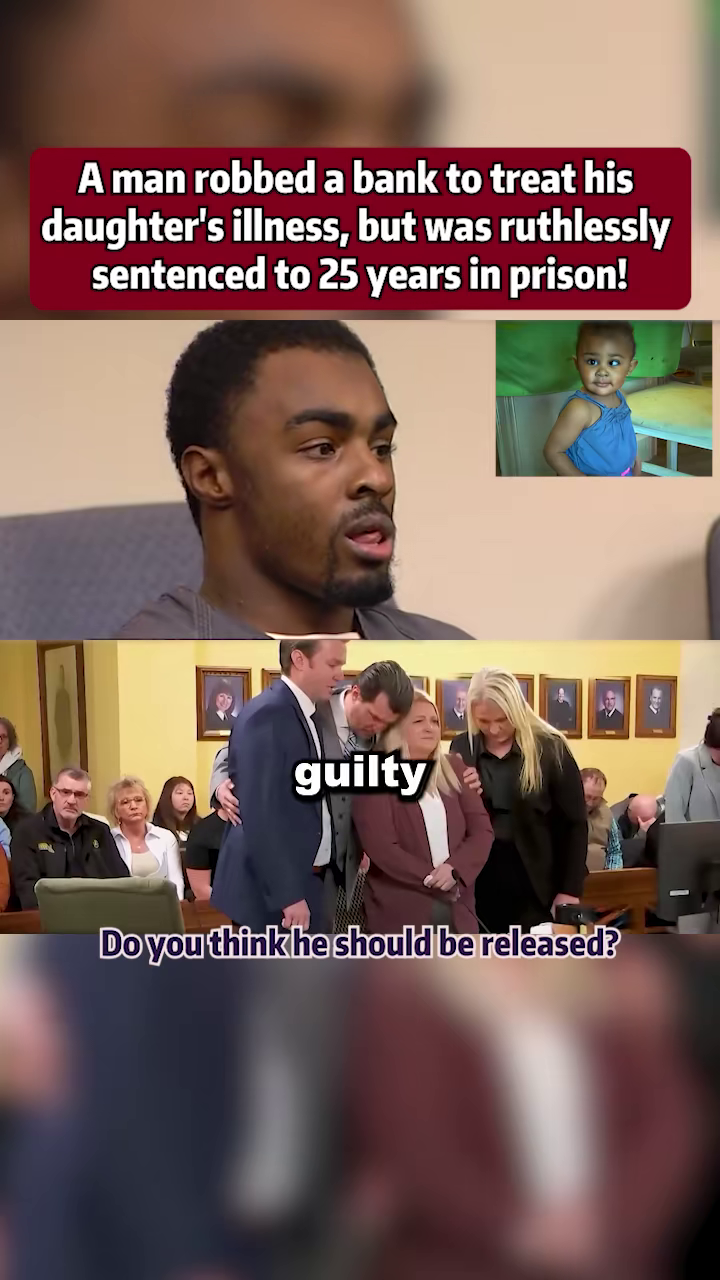When 23-year-old Brian Randolph walked into the Vibe Credit Union in South Lyon, Michigan, he didn’t wear a mask. He didn’t shout. He didn’t hurt anyone. But he quietly handed the teller a note demanding money. Minutes later, he walked out with thousands of dollars in cash.
To some, he was a criminal.
To others, he was a father trying to save his daughter’s life.
His story quickly spread across the nation — not just as a crime, but as a moral question: How far would you go to save someone you love?
Who Is Brian Randolph?
Brian was an ordinary Michigan man — a hardworking father, fiancé, and loved deeply by his friends and family. But behind that quiet life, a storm was rising.
His daughter, 1-year-old, was diagnosed with retinoblastoma, a rare eye cancer. Her treatment meant hospital visits, chemotherapy, medication, and endless bills.
According to his family, Brian’s insurance was suddenly canceled, and the treatments were about to stop. He claimed he felt helpless, desperate, and out of time.
The Day of the Robbery
August 2015.
Brian walked into Vibe Credit Union wearing a baseball cap and sunglasses. He approached the counter and slipped a handwritten note to the clerk.
The note read something like:
“Give me the money. No one gets hurt.”
No weapons were openly shown. No one was physically harmed. The teller followed instructions and handed over the cash.
In less than two minutes, Brian walked out of the bank and drove away.
Security cameras recorded everything.
His Reason — Desperation or Excuse?
Soon after the robbery, Brian’s story exploded on the internet.
His mother and fiancée claimed:
“He did it because he had no choice. The insurance stopped, and our baby needed chemo.”
They said the money was used to restart his daughter’s insurance and treatment.
Many people called him a “father in crisis,” comparing him to a character in a movie — someone who broke the law for love.
But Then… The Story Changed
When police arrested Brian two days later, they found surprising items in his car:
-
Designer clothes
-
A Gucci bag
-
Receipts from a shopping trip in Chicago
Prosecutors argued that this was not a desperate act — but a crime motivated partly by personal spending.
The judge said in court:
“You are not a hero. You are not just a desperate father. You are a bank robber.”
This shocked many who had supported him.
Courtroom Emotions: Hero vs. Criminal
Brian Randolph pleaded no contest to bank robbery — meaning he didn’t admit guilt but accepted conviction.
During the trial, his lawyer said:
“He panicked. He thought he was losing his child. He made a terrible choice, but it was out of fear, not greed.”
The judge, however, didn’t agree with the public’s sympathy.
She said firmly:
“You are not a wonderful guy. You are a bank robber. We don’t solve personal tragedies with crime.”
The Sentence
Brian was sentenced to:
-
45 months (nearly 4 years) to 25 years in prison
-
Required to pay back money to the bank
-
Under state supervision after release
Some people were angry — they believed he needed help, not prison.
Others believed justice was served — no excuse can justify putting innocent people in danger.
What Happened to His Daughter?
According to family statements given to reporters:
-
His daughter’s treatment continued and her insurance was reportedly reactivated.
-
She responded well to chemotherapy.
-
She survived and grew up with her mother while Brian remained behind bars.
Life in Prison
While in prison, Brian reportedly worked, attended therapy, and focused on being able to reunite with his daughter one day.
He said in court:
“I regret everything. I wasn’t thinking straight. I just wanted my baby to live.”
A Nation Divided — The Moral Question
The internet remains divided. Discussions, videos, and comments continue to ask:
💬 Was he a hero or a criminal?
💬 Should a parent go to jail for choosing their child over the law?
💬 Or should society have helped him before he even reached that point?
Arguments in His Favor
Supporters argue:
-
He didn’t hurt anyone.
-
He turned to crime after the system failed him.
-
Medical costs in the U.S. are extremely high, pushing some families to the edge.
-
A father trying to save his child isn’t the same as a man stealing for greed.
Arguments Against Him
Critics point out:
-
He still committed a violent crime (bank r*bbery is considered dangerous even without a visible weapon).
-
Innocent people could have been harmed.
-
Evidence showed luxury spending, not only medical expenses.
-
If everyone broke the law during hardship, society would collapse.
Where Is Brian Randolph Now?
Brian’s earliest release date based on reports would be after serving around 45 months, meaning he may now be out of prison or close to release.
His current whereabouts remain private.
Lessons from This Story
This case teaches society powerful lessons:
✔ Desperation can push people to dangerous places.
✔ Medical struggles can break even the strongest families.
✔ Crime creates more pain — no matter the reason.
✔ Forgiveness and justice don’t always agree.
✔ We must fix systems so people don’t have to choose between breaking the law and saving someone they love.
Conclusion
Brian Randolph’s story is not black and white.
He is not fully villain.
He is not fully hero.
He is a flawed human who loved his child but made a choice that changed his life forever.
So, the world still asks:
What would you have done, if it was your child?

